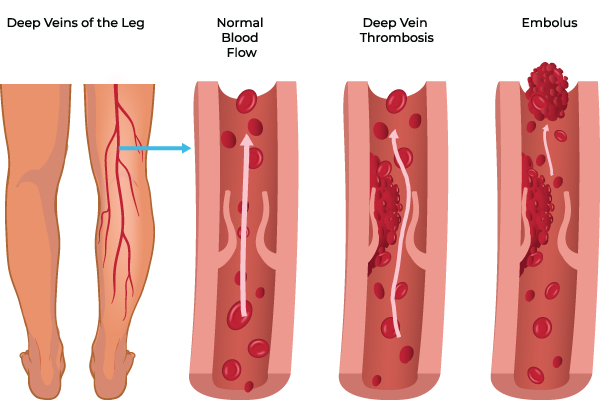Deep Vein Thrombosis
Deep vein thrombosis is a blood clot in a deep vein, usually in the legs.
This condition is serious because blood clots can loosen and lodge in the lungs. They can interfere with the way blood normally flows up from the legs to the heart. This type of blood clot is often abbreviated DVT.
While DVT may sound rare, it is actually quite common. In fact, more than 200 cases per year are reported in the United States.

How Will I Know if I have Deep Vein Thrombosis?
You may have some leg pain or swelling, but it may be difficult to know if you have a DVT blood clot.
Your provider will conduct lab tests or imaging to confirm the medical diagnosis.
Depending on the severity, your doctor will recommend treatment. Some may resolve in a few months, while other cases may need critical emergency care.
What Treatment Options are Available for Deep Vein Thrombosis?
Your provider will do a series of tests to confirm your deep vein thrombosis. Depending on your need, you may utilize the following to help:
Compression
Stockings
Compression stockings or socks can help treat symptoms DVT. DVTs tend to form in your upper or lower leg. These blood flow issues can cause blood to pool in your legs. Stockings can help avoid clotting.
Anticoagulant
Medicines
These reduce the blood’s ability to clot and stop existing clots from getting bigger. Heparin and warfarin are two types of anticoagulants often used to treat DVT. Heparin is usually prescribed first because it works immediately to prevent further clotting.
Medical
Technology
The Control 11F mechanical thrombectomy system has been approved to help remove large blood clots in patients with DVT but comes with some risks of removing too much blood. New advancements in technology are working to alleviate the symptoms of DVT in a safe and effective manner.
Which treatment option is best for you?
Your provider at Veinology Health will work with you to see which option is best for you.
Most patients recover completely within several weeks to months without significant complications or long-term adverse effects. However, long-term problems can occur, with symptoms ranging from very mild to more severe so it is best to talk to your provider.
Schedule an Appointment Today!
Give us a call at 888-783-0111 today and we can help you avoid complications of DVT.
